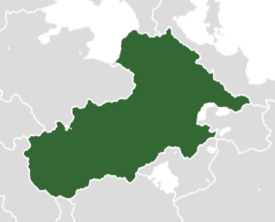Bakyern
This article is incomplete because it is pending further input from participants, or it is a work-in-progress by one author. Please comment on this article's talk page to share your input, comments and questions. Note: To contribute to this article, you may need to seek help from the author(s) of this page. |
Bak Confederation Bakischer Konföderation | |
|---|---|
|
Flag | |
Motto: "Arbeit, Kraft, Intelligenz." "Work, strength, and intelligence" | |
Anthem: Die Stimme des Bak-Volkes | |
 | |
| Capital | Federal District of Wicht |
| Largest city | Beselsingen |
| Official languages | German |
| Recognised national languages | German Common |
| Religion | Roman Catholicism Samiism Weudalism |
| Demonym(s) | Bak |
| Government | Federal Semi-Direct Democracy Directorial Republic |
• Federal Directory Council | Bernhard Strassmann (FCP) Annelie Bachmayer (PP) Gregor Schatz (CC) |
• Federal Chancellor | Ernsta Bauer |
| Legislature | Federal Assembly of the Confederation |
| Canton Assembly | |
| National Confederate Council | |
| Area | |
• | 2,058,726 km2 (794,879 sq mi) |
| Population | |
• 2020 census | |
• Density | 47.37/km2 (122.7/sq mi) |
| GDP (PPP) | estimate |
• Total | |
• Per capita | |
| GDP (nominal) | estimate |
• Total | |
• Per capita | |
| Gini | 30.3 medium |
| HDI | 0.938 very high |
| Currency | Bak Gild (bg) |
| Time zone | UTC-4 |
| Driving side | right |
| Calling code | +4 |
| Internet TLD | .bk |
The Bak Confederation or more commonly known as Bakyern, is a country in Anteria located in the eastern region of the Thuadian continent. It is bordered by Junterland to the east, Grafenland and Zhousheng to the south, and Nortence to the north. It's a sovereign confederal-type country with 5 cantons and 27 federal states. It has Wicht as its capital and is led by a directorial council of 3 members.
Government
Federal Government
Legislation
Law Enforcement
Foreign Affairs
Economy
The Bak economy is a market economy, with a lot of the country's workforce being a skilled labor force. It's an important economic powerhouse in the region surrounding it, with Gabrielland considering Bakyern a main economic rival. By 2020, the Bak GDP is estimated to be around $5.48 trillion with a GDP per capita of $56,000. Bakyern is considered a developed country, with a lot of exports consisting of manufactured goods such as pharmaceuticals, electronics, automobiles, and medical equipment among others.
Infrastructure
Energy Infrastructure
Demographics
Population
The population of Bakyern has been reported be 97 million. The population is mainly centered around major cities or state capitals, with a scarce number of people living in the western countryside. The largest city in Bakyern is Beselsingen with a population of 5 million, which is more than the population of Bakyern's capital city which is an estimated 3 million.
Bakyern's birth rate has been seen to be increasing since the 90's, with the population estimated to reach 120 million by 2025. The immigrant population in Bakyern is considerably low, with an estimated only 900 thousand immigrants with Bak citizenship living in the country.
Education
The Bak public education system is operated by the state governments and Executive Department of Education. The public education system is well-funded when compared to other countries, with an estimated 67% of the Bak population studying in the public sector. Children are required to pass all grades before deciding on whether to continue an education in college or university or not continue education. An estimated 89% of students go through university or college and pass.
The private sector is run by separate companies or non-profit organizations but are still regulated by the Executive Department of Education, with students required to pass all grades like in the public sector. According to a census, 33% of children in Bakyern study in the private sector. The number of students who go onto university or college is higher than that of the public sector, with 95% of students going to university or college.
While Bakyern's education system has been praised for "being a model and efficient education system", concerns have been raised on how the system 'over-educates' children, meaning more skilled workers and less unskilled workers, with demand for unskilled workers rising since the early 2000s.
Military
Bakyern's armed forces is the Bak Nationalwehr with the commander-in-chief being the President of Bakyern. The Executive Department of War is in charge on all matters of national defense. The majority of the armed forces consists of reserves while a select few are serving in missions in Khemmi and Azureden. Bakyern has no standing navy, with all the military vessels Bakyern has under service of seperate Territorialheer. Due to this, Bakyern's capabilities to wage war overseas is extremely limited, with only the Bak Luftwaffe being able to operate overseas.
Bakyern has a nuclear arsenal consisting of 127 nuclear warheads, which are launched using missiles or by air. Bakyern's capability of using chemical and biological warfare is known, with them being used in the past. The usage of these weapons are restricted due to accords which prohibit the use of these weapons.
The Nationalwehr has a budget of around $80 Billion. Conscription is not in effect but can only be put into affect when Bakyern's position in a conflict is dire and Bakyern's borders are at risk. Teenagers, with parental guidance, can enlist at the age of 16 to receive longer training. 17 year olds can join the military without guidance from parents or legal guardians.
